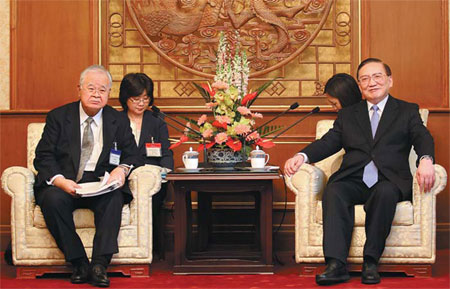Islands are root of tension
|
Tang Jiaxuan (right), former State councilor and head of the China-Japan Friendship Association, meets visiting chairman of the Japan Business Federation Hiromasa Yonekura in Beijing on Thursday. Zhang Wei / China Daily |
Sino-Japanese ties feeling strain from illegal 'purchase'
The Diaoyu Islands are the root of tension in Sino-Japanese ties, former State councilor Tang Jiaxuan told visiting business leaders from Japan on Thursday.
The delegation is the first of leading Japanese business figures to visit China since the new leadership was unveiled in Beijing last week.
The group is led by Fujio Cho, chairman of the Japan-China Economic Association, and includes Hiromasa Yonekura, chairman of the Japan Business Association.
Tang began his talk by telling the guests he was delighted at their arrival, particularly at a time when China-Japan ties are so strained.
"The two countries are neighbors of great significance to each other, and the Chinese have not changed their commitment to the development of China-Japan relations," said Tang, a veteran diplomat who now chairs the China-Japan Friendship Association.
Sino-Japanese ties were damaged after the Japanese government illegally "purchased" parts of China's Diaoyu Islands in September, a major provocation that prompted huge protests in China.
As for Japan, "the only way out" of the situation lies in Japan's efforts to "face up to history and reality", Tang said.
An effective way should be found to properly manage and solve the problems through dialogue and negotiation, Tang added.
LyuYaodong, director of the department of Japanese diplomacy at the Institute of Japanese Studies at the Chinese Academy of Social Sciences, said the visit proved that "communication between the countries in the economic sphere is normal".
"Whether ties can get back on track depends on the Japanese government's sincerity, which needs to be tested," Lyu said.
The Japanese guests told Tang that a healthy, stable development of ties "matters to the prosperity and stability of Asia and the world".
Gao Hong, Party chief of the Institute of Japanese Studies at the CASS, said Beijing's reception of the visiting Japanese business delegation also "sent a positive signal" to everyone in Japan, especially to entrepreneurs.
"But it is not that easy to restore China-Japan relations overnight," Gao said.
US-Japan military talks
The Ministry of National Defense told China Daily on Thursday that Beijing "firmly opposes any attempt that may aggravate or complicate the situation" in response to ongoing US-Japan defense contingencies regarding the Diaoyu Islands.
Japanese media reported that Japan and the United States have started mapping out joint operational plans over the Diaoyu Islands and the entire East China Sea.
Shigeru Iwasaki, chief of the Joint Staff of the Japanese Self-Defense Forces, and Samuel Locklear, commander of the US Pacific Command, were scheduled to meet in Hawaii on Thursday and Friday, Japan's Kyodo News Agency reported.
Japan had sounded out the US on devising joint contingency plans in light of concerns that an accidental clash over the islands in the East China Sea could develop into "an armed conflict" between Asia's two biggest economies, Kyodo said.
"The Chinese army's determination and will in defending national sovereignty and territorial integrity is unshakable," the ministry said in a written reply.
Washington and Tokyo are expected to agree on accelerating the drafting of the plans, Kyodo quoted unnamed sources as saying.
The news came in the wake of the Japanese media's recent hype over the alleged naval "radar lock-on" incident.
Zhang Junshe, a senior researcher at the People's Liberation Army Naval Military Studies Research Institute, said Japan is trying to hype a false alarm by projecting the image that "China has inched to the brink of war".
"And Tokyo is sparing no effort in exaggerating the so-called common threat to the US-Japan alliance in an attempt to force Washington to lift restrictions on Japan's military expansion plan," Zhang said.
Beijing has dismissed Japanese Defense Minister Itsunori Onodera's claim in early February that a Chinese navy vessel had "locked its fire-control radar" on a Japanese destroyer in the East China Sea in late January.
Tokyo has failed to provide any evidence for the allegation.
Liu Yedan contributed to this story.
zhangyunbi@chinadaily.com.cn
(China Daily 03/22/2013 page10)















